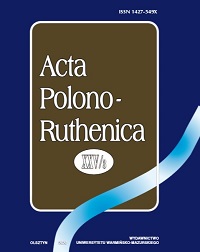Метафорическая репрезентация лжи и обмана (на материале современной российской прессы)
Metaphorical representation of lies and deception (based on the material of contemporary Russian newspapers)
Author(s): Lukasz MaleckiSubject(s): Social Sciences, Language and Literature Studies, Studies of Literature, Philology
Published by: Wydawnictwo Uniwersytetu Warmińsko-Mazurskiego w Olsztynie
Keywords: metaphor; metaphoric representation; lie; fake; media discours
Summary/Abstract: Metaphor is assigned the role of one of the most productive means of forming secondary names in creating a linguistic picture of the world, which has the property of imposing a specific view of the world on speakers of a certain language. Modern cognitive linguistics considers metaphor not as a trope designed to decorate speech and make an image more understandable, but as a form of thinking. In communicative activity, metaphor is an important means of influencing the intellect, feelings and will of the addressee. Currently, in everyday communication there is an increased aggressiveness of statements, the active use of confrontational strategies and tactics of speech behaviour, e.g. many kinds of threats, ignorance, discrediting, labelling, insults and deception. Deception is undoubtedly one of the most significant social phenomena but, at the same time, it is distinguished by a high degree of abstractness. The abstractness of the semantic content of deception, in turn, prompts to refer to vocabulary with a more specific meaning. This article is devoted to the consideration of metaphor as a means of verbalizing lies and deceit in modern Russian. The object of the research is a metaphor that functions in the language of modern Russian-language newspaper, in turn, the subject is a metaphor that outlines the linguistic implementation of lies and deceit, which is a vivid means of verbalizing an assessment, in particular in the print media. The research material was the Russian-language newspaper and journalistic texts of the leading high-circulation print media, for example: Novaya Gazeta, Nezavisimaya Gazeta, Vesti, Rossiyskaya Gazeta, Kommersant and others. As a result of the analysis of factual material selected from the modern Russian-language press, it is possible to identify several schemes – metaphorical models that reveal the mechanism of a metaphorical description of deception and its varieties. Metaphors in great demand turn out to be those of an aggressive nature: metaphors of deception (criminal and military), metaphors of the water element (hydronymic), as well as economic, morbial and anthropomorphic metaphors. Deception, lies, and fakes are most often characterized as entities that are beyond the control of a person, independent of them, although they are verbalized in speech with the modelling of an entire system of schemes. In addition, in the Russian-language press, deception and its varieties areperceived as independent, all-pervading, often mystical entities, before which a person turns out to be a weak and powerless being, characterizing a person as passive, powerless over their activities, inclined to dependence on some more powerful forces.
Journal: Acta Polono-Ruthenica
- Issue Year: 3/2020
- Issue No: XXV
- Page Range: 127-153
- Page Count: 27
- Language: Russian

